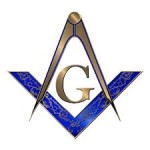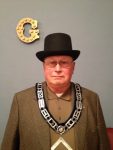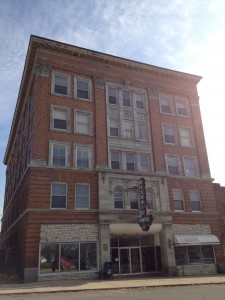Freemasonry – Marshall Lodge #108 A.F.& A.M. the Blue Lodge
Meets on the second Thursday at 7:00 PM.
Supper is served at 6:00 PM.
Worshipful Master: Milan “Mick” DuBois
Freemasonry is a fraternal organization that arose from obscure origins in the late 16th to early 17th century. Freemasonry now exists in various forms all over the world, with a membership estimated at around six million, including approximately 150,000 under the jurisdictions of the Grand Lodge of Scotland and Grand Lodge of Ireland, over a quarter of a million under the jurisdiction of the United Grand Lodge of England, and just under two million in the United States.
The fraternity is administratively organized into independent Grand Lodges or sometimes Orients, each of which governs its own jurisdiction, which consists of subordinate (or constituent) Lodges. The various Grand Lodges recognize each other, or not, based upon adherence to landmarks (a Grand Lodge will usually deem other Grand Lodges who share common landmarks to be regular, and those that do not to be “irregular” or “clandestine”).
There are also appendant bodies, which are organizations related to the main branch of Freemasonry, but with their own independent administration.
The fraternity is widely involved in charity and community service activities. In contemporary times, money is collected only from the membership, and is to be devoted to charitable purposes. Freemasonry worldwide disburses substantial charitable amounts to non-Masonic charities, locally, nationally and internationally. In earlier centuries, however, charitable funds were collected more on the basis of a Provident or Friendly Society, and there were elaborate regulations to determine a petitioner’s eligibility for consideration for charity, according to strictly Masonic criteria.
Some examples of Masonic charities include:
- Homes that provide sheltered housing or nursing care.
- Education with both educational grants or schools such as the Royal Masonic School (UK) which are open to all and not limited to the families of Freemasons.
- Medical assistance.
- Masonic Child Identification Programs (CHIP).
In addition to these, there are thousands of philanthropic organizations around the world created by Freemasons. The Masonic Service Association, the Masonic Medical Research Laboratory, and the Shriners Hospitals for Children [ are especially notable charitable endeavors that Masons have founded and continue to support both intellectually and monetarily.
Contrary to common misconception, joining Freemasonry is not by invitation only. In fact, in many jurisdictions, the brothers of the lodge are not allowed to ask potential candidates to join (in these jurisdictions, the brethren must wait for the potential candidate to inquire). Other jurisdictions allow for varying degrees of solicitation.
However the initial introduction is made, the official process of becoming a Mason begins when a candidate for Freemasonry formally petitions a lodge. The brethren will then investigate the candidate, to assure themselves of his good character, and hold a secret ballot election (often using an old fashioned ballot box).
Generally, to be accepted for initiation as a regular Freemason, a candidate must:
- Be a man who comes of his own free will.
- Believe in a Supreme Being (the form of which is left to open interpretation by the candidate).
- Be at least the minimum age (from 18–25 years old depending on the jurisdiction. In some jurisdictions the son of a Mason, known as a “Lewis,” may join at an earlier age than others).
- Be of good morals, and of good reputation.
- Be of sound mind and body (lodges had in the past denied membership to a man because of a physical disability; however, now, if a potential candidate says a disability will not cause problems, it will not be held against him).
- Be free-born (or “born free”, i.e., not born a slave or bondsman). As with the previous, this is entirely an historical holdover, and can be interpreted in the same manner as it is in the context of being entitled to write a will. Some jurisdictions have removed this requirement.
- Be capable of furnishing character references, as well as one or two references from current Masons, depending on jurisdiction.
Some Grand Lodges in the United States have an additional residence requirement, candidates being expected to have lived within the jurisdiction for a certain period of time, typically six months.
Having been elected and initiated, a member may subsequently resign from membership if he so desires. Additionally, the fraternity may either suspend or expel a member for cause.
Freemasonry explicitly and openly states that it is neither a religion nor a substitute for one. “There is no separate Masonic God”, nor a separate proper name for a deity in any branch of Freemasonry.
Regular Freemasonry requires that its candidates believe in a Supreme Being, but the interpretation of this term is subject to the conscience of the candidate. Consequently, Freemasonry accepts men from a range of faiths, including (but not limited to) Buddhism, Christianity, Hinduism, Islam, Judaism, and Sikhism. As a result, Freemasonry uses Volume of the Sacred Law (VSL) as a generic term for a religious book. Freemasonry requires that a VSL be present on the Altar, many Lodges have multiple VSLs available, and a candidate can be obligated on his book of choice.




